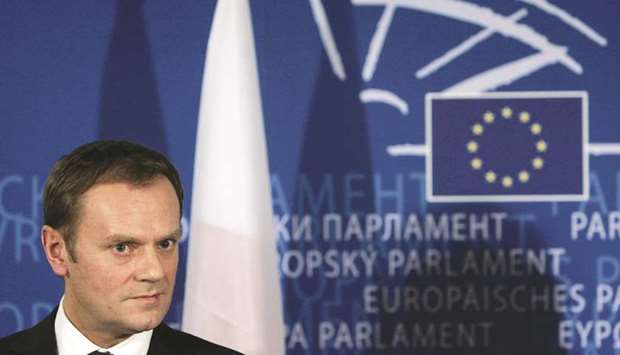European Council President Donald Tusk said yesterday that he is alarmed by the similarity of policies pursued by Poland’s right-wing government to what he described as “Kremlin’s plan”.
Poland’s ruling Law and Justice (PiS) party has been increasingly at loggerheads with the EU and Tusk since coming to office in late 2015, although the acrimony between Tusk and PiS dates back many years.
The PiS is locked in disputes with the bloc over immigration, logging of an ancient forest and putting courts and media under more government control.
Tusk, Poland’s former prime minister and the arch-rival of PiS leader Jaroslaw Kaczynski, won a second term in March as chairman of EU summit meetings – with Poland the only country to vote against his extension.
“Alarm! A vehement dispute with Ukraine, isolation in the European Union, departure from the rule of law and independent courts, attack on non-governmental sector and free media – PiS strategy or Kremlin’s plan?” Tusk tweeted. “Too similar to rest easy.”
Tusk was referring to, among other things, the fact that Ukraine summoned the Polish ambassador in Kyiv on Saturday after Poland denied entry to a Ukrainian official in an escalation of a diplomatic spat over the two neighbours’ troubled past.
Tusk did not provide details of what he described as the “Kremlin’s plan”.
In May, Tusk urged Group of Seven leaders on to stick to their sanctions policy on Russia over the Ukraine crisis.
Tusk also sided with member nations such as Poland and the Baltic states in their efforts to oppose a new pipeline connecting Russia and Germany.
The Polish government denies all charges from Brussels that it is undermining the rule of law or isolating Poland in Europe, saying that it needs to overhaul Poland’s ineffective legal system and stand up for Poland’s interests in the EU.
On Wednesday a majority of EU lawmakers demanded punishment for the eurosceptic government in Poland, saying that it was undermining the rule of law and promoting intolerance.
In a response to Tusk’s comment, Prime Minister Beata Szydlo tweeted: “@donaldtusk as @eucopresident has done nothing for Poland. Today, using his position to attack the Polish government, he is attacking Poland.”
In March, Poland’s defence minister accused Tusk of working with Russian President Vladimir Putin to harm Polish interests following the 2010 plane crash that killed president Lech Kaczynski – Jaroslaw’s twin brother – and 95 others.
In April, Tusk testified for eight hours in a separate intelligence probe by Warsaw’s right-wing government that he described as a smear campaign to discredit him.
The latest incident in the ongoing spat between Ukraine and Poland, started on Saturday with Poland’s decision to refused entry to the head of Ukraine’s commemoration commission, Svyatoslav Sheremet.
Polish state news agency PAP reported that this was in response to a ban imposed earlier this year by Kyiv on the exhumation of Poles killed in Ukraine during World War II.
“The Ukrainian side has complained that Mr Sheremet was not allowed into Poland,” Poland’s ambassador to Kyiv Jan Pieklo told PAP after the meeting with Ukrainian authorities.
“I have been also informed that this is a problem that concerns the restarting of exhumations because Sheremet is the person responsible for this,” Pieklo said, adding that both sides had agreed that the exhumations should be restarted.
In an apparent effort to mend ties, representatives of the Polish and Ukrainian presidents said on Friday that they “reconfirmed their commitment to strengthening the strategic partnership”.
“The parties agreed that the ban on the search and exhumation works in Ukraine should be lifted,” the statement published on Friday said.
The denial of entry to Sheremet came after the Polish foreign minister said earlier in November that Poland would bar Ukrainians with “anti-Polish views”.
Last year Poland passed a resolution that declared the World War II-era killing of about 100,000 Polish men, women and children by units in the Ukrainian Insurgent Army (UPA) “genocide”.
Ukraine rejects that label, saying that the killings were a result of bilateral hostilities.

Tusk: Too similar to rest easy.
